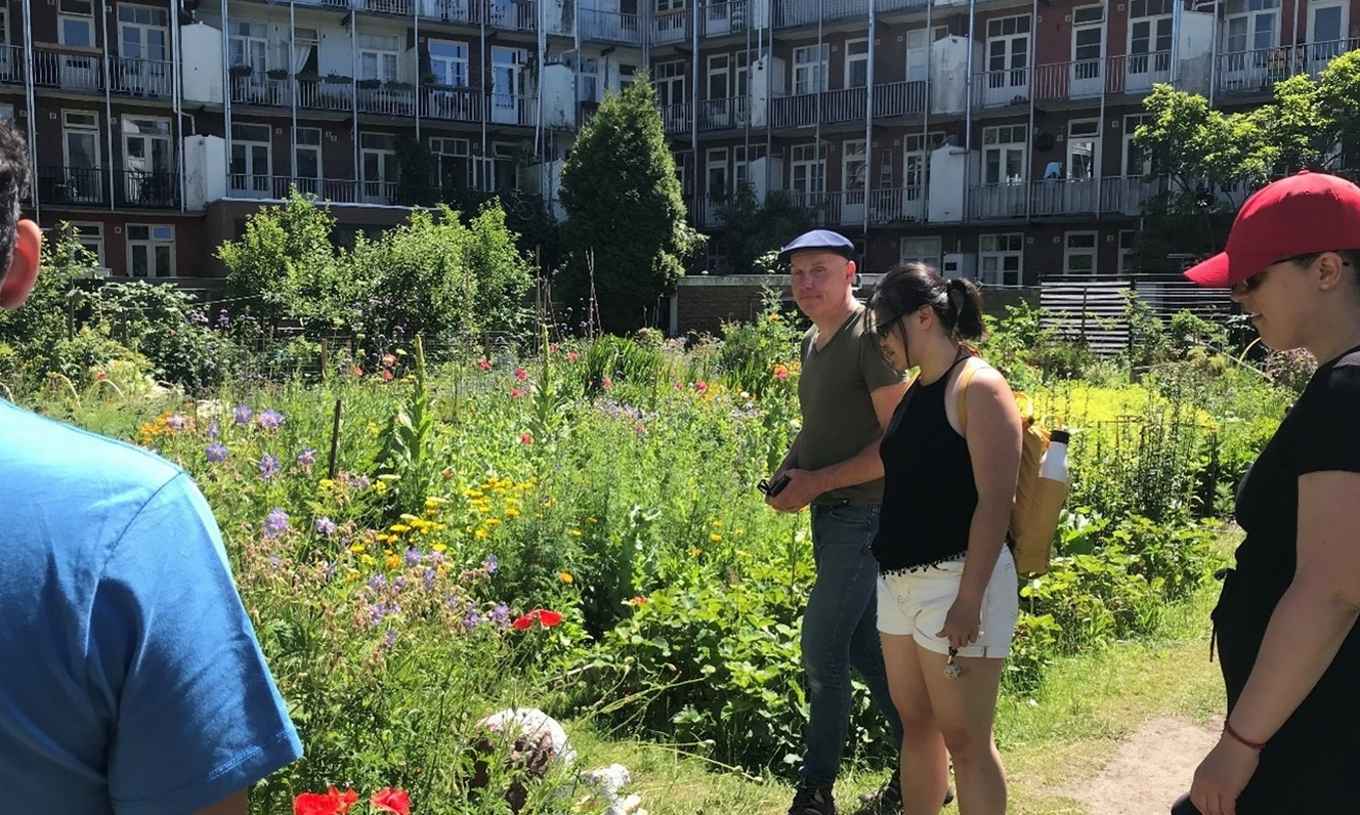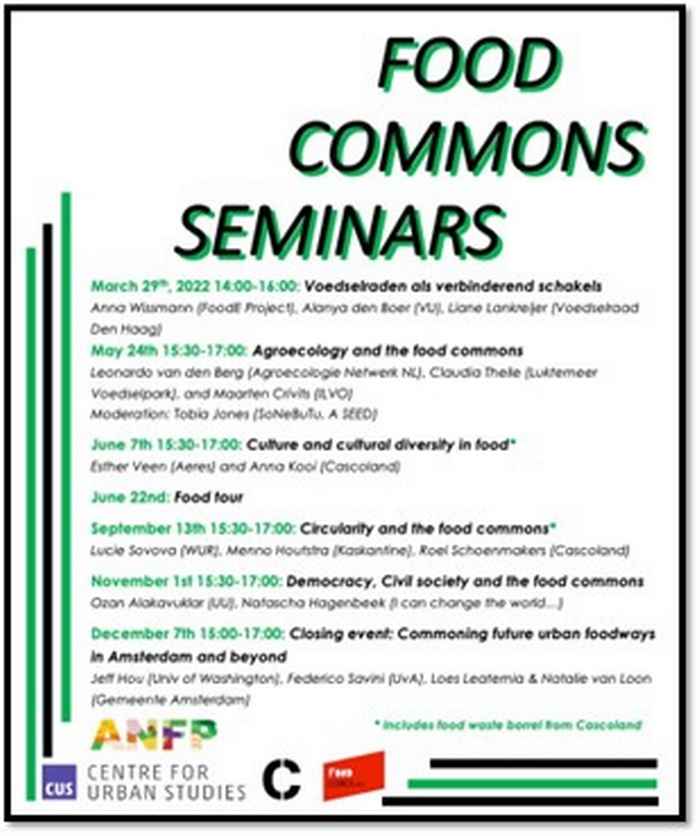Urban food commons seminar series: Challenges and opportunities for Amsterdam
Ciska Ulug, Jannes Willems, Ying-Tzu Lin
Urban food commons
The food system, as it currently operates, on a global scale and through industrial means, is broken. We witness this in the many challenges it fails to address – whether that is healthy food access, environmental sustainability, or democratic participation (Ilieva, 2016; Wiskerke, 2009). Many global challenges today are, in fact, connected to our relationship with food, and specifically the valuing of food as a global commodity.
The food commons is a perspective that challenges this unidimensional aspect of food and has been recently celebrated as a means towards a food system that embeds sustainability, justice, and care (Vivero-Pol et al., 2019). While the commons are broadly described as resources governed and managed by communities, food commons highlights many values of food that arise with more democratic decision making, including as a public good, a human right, and a renewable resource (Vivero-Pol, 2017).
Cities are considered especially important places to establish food commoning practices, as they drive food consumption, distribution, and production. Practices related to urban food commoning can include establishing food policy councils, rescuing food waste, and exchanging garden produce (Leitheiser and Horlings, 2021; Morrow, 2019). Citizen initiatives and communities especially play a large role in the creation and sustaining of an urban food commons, which could include community gardens, food waste cafes, or local markets. As such, adapting food practices in cities towards commoning structures will strengthen an urban food commons and can help transform the urban food system.
Seminar series
With the seed grant sponsored by the Centre of Urban Studies, we dove into topic of the urban food commons in Amsterdam. Over the course of 2022, we hosted five seminars, a food tour and a closing symposium at Pakhuis De Zwijger. Each seminar approached a different theme of urban food commons, where we invited academics and practitioners to sit together to discuss topics such as food policy, agroecology, culture, circularity and democracy (see Figure 1 for a list of the different seminars and speakers).
Amsterdam specifically has a tradition of urban food policy making since 2007. Furthermore, the city has shown commitment to experiment with commoning practices in the city through appointing an urban commons organizational unit. Amsterdam consequently has the opportunity to institutionalize urban food commoning in its municipal strategies, as support for the ongoing food initiative movement in civil society. Therefore, we asked: if we adopt an urban food commons lens, what are the implications for the city of Amsterdam? And what could an urban food commons offer the city?
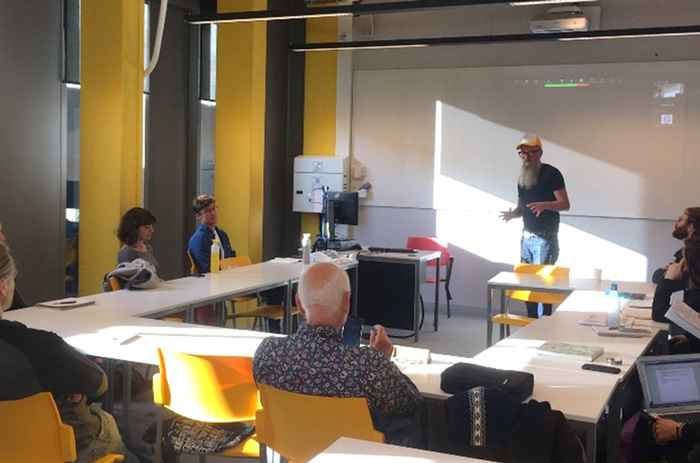
In search for food commoning practices “on the ground”, during the seminars, we located challenges that have prevented the food commons from taking root in Amsterdam, as well as opportunities for next steps.
First, existing policies and institutions provide limited space for alternative economic models. Many food initiatives are embedded in community and diverse economies, outside a market economy. Yet, such models often remain tied to the neighborhood level with limited interaction and upscaling opportunities, partially due to an nonreceptive institutional environment that prefers market systems. For example, Kaskantine, an off-grid community organization which leads activities, such as urban gardening, composting, and food waste distribution, grapples with traditional revenue streams and instead attempts to substitute different forms of capital (e.g. social , distributive, and technological capital), to buffer their financial situation. However, such economic forms are still challenged by the necessity to engage with market economies, threatening their ability to survive.

Second, the lack of access to physical space was experienced by many initiatives. In a highly urbanized area such as Amsterdam, many initiatives have short-term land tenures. Although some initiatives were able to locate their own “cracks'' in the system, many examples were limited to short term use in small neighborhood plots. An exemplary case is the Food Park (Voedselpark) Amsterdam which clashes with the municipality of Amsterdam’s plans for a new logistic center on the Luktemeerpolder. Therefore we witness, more than land scarcity, real structural barriers where economic values are prioritized over social and environmental uses.
The third barrier relates to political ambivalence: despite having high ambitions in the Amsterdam Food Strategy, actual on the ground practices demonstrate the opposite. Many policies aim to stimulate regional economic growth and housing densification, clashing with local food initiatives and urban commons practices. Our findings point towards a need for sharper decisions, or at least more alignment between opposing forces.
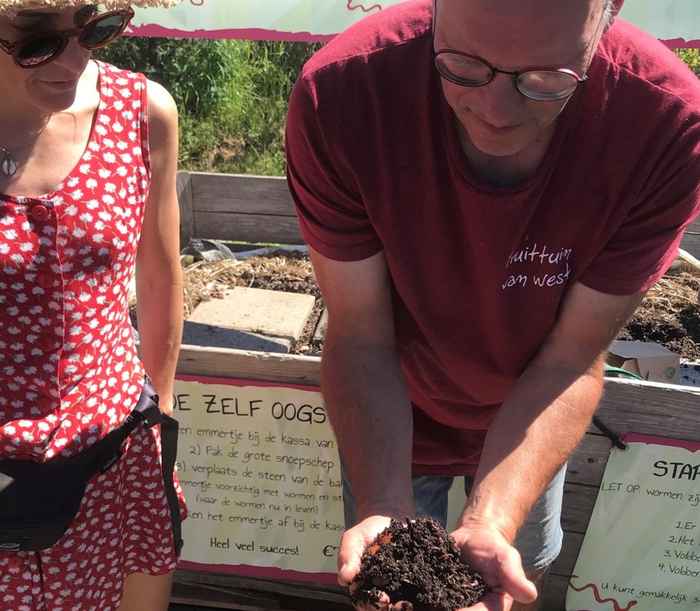
Nonetheless, we also identified a number of opportunities that could foster food commoning:
First, Amsterdam holds several initiatives that form intermediaries within the local and regional food system. Examples include the citizen-led Food Council Metropolitan Region Amsterdam, the platform Voedsel Verbindt with more institutionalized partners, and research networks such as the Amsterdam Network for Food Planning. In addition, several ‘street-level bureaucrats’ work on behalf of the Municipality of Amsterdam closely with these initiatives. These initiatives and intermediaries provide a space for food system decision making, to foreground wider value systems of food. As such, there is a promising ecosystem already in place for nurturing food commoning practices, with potential for expansion.
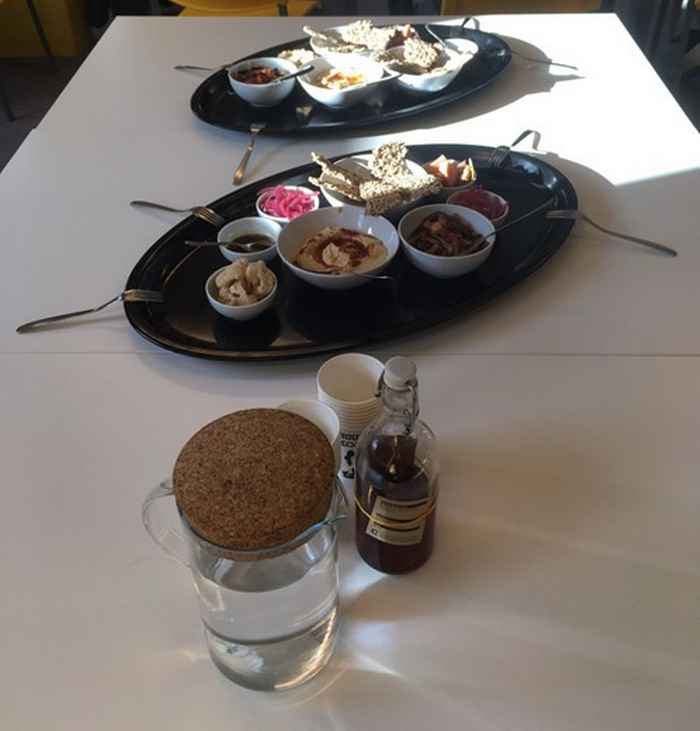
Second, new frameworks, such as agroecology, are emerging which can potentially create symbiotic relationships with nature, also in cities. Agroecology is a form of sustainable agriculture which integrates the use of ‘old’ technologies with ‘new’ insights, integrating ecological principles, with a social conscious. Expanding the (physical) commons through agroecology could bring the many benefits of urban nature, such as health and wellbeing, lowering heat stress, and biodiversity. Experimenting with new frameworks and solutions can provide creative methods and opportunities for implementing a food commons, which also embed ecological and social values and services.
Third, there are a number of initiatives and practices which are actively promoting accessibility and inclusivity. Such activities build up networks of care and trust in neighborhoods between citizens that do not always meet and interact with each other. As a result, these activities utilize food and commoning to build relationships of care and trust.
During the closing event, at Pakhuis de Zwijger, we presented these insights and reflected with a group of researchers, policy-makers, citizens and communities, on the implications and next steps. It became clear to us this year that in Amsterdam there is plenty of thinking and working on a more sustainable local food system. However, these food initiatives - from residents, entrepreneurs, researchers and the municipality - are fragmented and lack long-term political-administrative support. More systematically working together with policy makers, researchers, and communities can help to counteract the fragmentation, and thus better utilize the potential of food initiatives and the urban food commons in making the food system more sustainable.
You can read more about our findings in our report, Urban Food Commoning: Implications and opportunities for Amsterdam, which you can find here.
